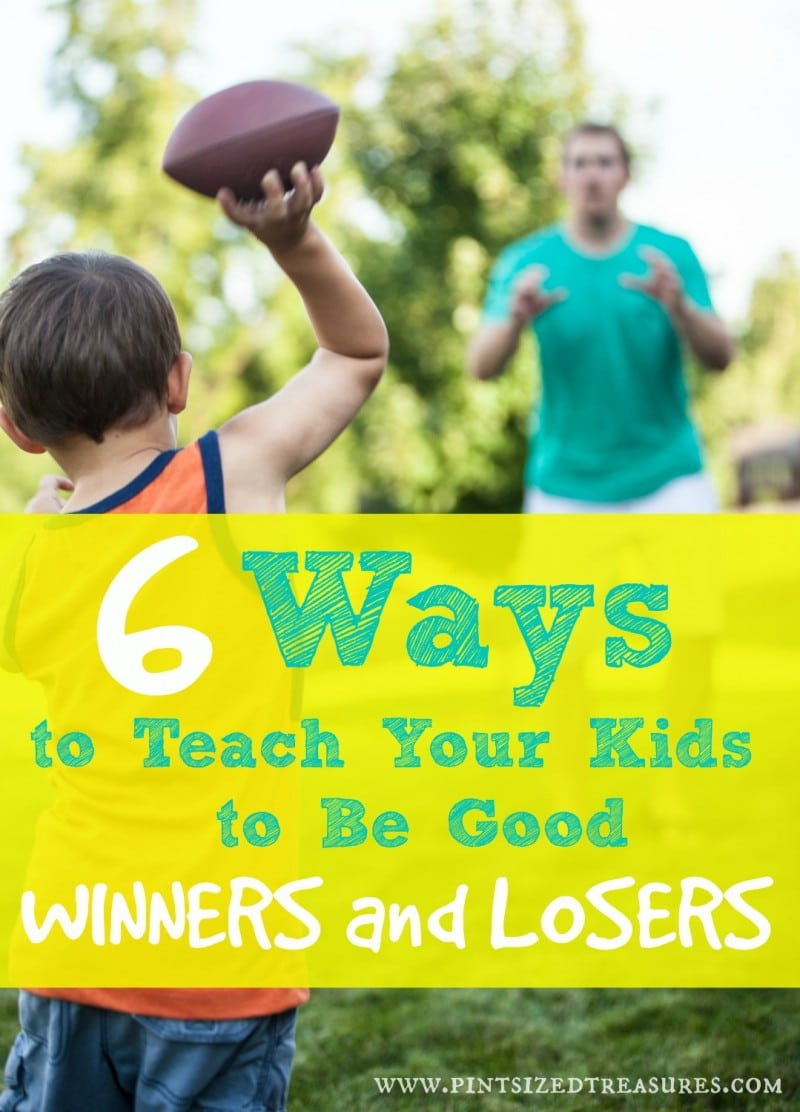Winning and losing is a part of real life. A part that kids need to learn about before they face the real world. As moms, our job is to prepare them for the outside world while they are young. It’s easy to celebrate a victory, but much, much MUCH more difficult to accept defeat in an honorable way. This is how my mom-lesson went with my kids one day. It seemed to really help many of my kids learn how to be gracious losers when playing with friends or family. See if they work for yours!
Three of my kids were dressed in yellow with anticipating smiles that were contagious. My three
other kids were dressed in matching black shirts and feverishly performing warm-up exercises to build
strength and speed. It was uber-cute to watch.
It was summer break, and my kids desperately needed some activities to fill their mundane, school-less days. On a whim, I decided to do an at-home field day overflowing with fun, creative and physically challenging activities which were loaded with a lot of chances for the kids to experience being winners and losers.
[include id=”6″ title=”inside post ad”]
I explained the cold, hard facts to the excited youngsters:
- We’re keeping score!
- Only one team will win.
- Everyone has to try their best.
- No tears allowed!
- Make it real. Today it’s only losing a baseball game or soccer game, but later it may be losing a promotion on the new job. Losing and winning are all a part of reality. It is not just an aspect of fun and games, but a part of everyday life. Remind your kids that as adults, they will win and lose as well. They need to accept the truth now that they are not going to be the best at everything. My dad often told my brothers and I that someone will always be smarter, prettier and more talented than us. It was true. The sooner I learned that the better!
- Point out “the greats.” Even professionals and skilled artists fumble sometimes. Choose a profession that your child admires and research “the greats”. Make notes of their failures as well as their accomplishments. When you mention the failures, remind your child that all people that have excelled in their goals also had some failures along the way. Showing your kids the real truth about failure will aid them in receiving failure more graciously.
- Focus on improvement, not winning. If the main goal of the activity or game your child is involved in is winning, he will end up being disappointed numerous times. Instead, aim to direct your child’s focus on improving a certain skill in each activity in which he participates. If he is playing basketball, you could focus on the art of dribbling and passing. As these skills improve, work on improving dunks. If the child succeeded in those areas, than he was successful, win or lose.
- Be an example. Your kids are watching your reactions in the home, at church and with friends. They see the expression on your face when someone else is nominated to the position at church you desired to hold. They intently listen to the inflections in your voice as you casually announce that someone else was chosen for the main solo in the church cantata. Kids need to see their parents effectively live out being a gracious loser or winner.
- Encourage a heart of thankfulness. Teach kids to be thankful that they have abilities to compete. Who gave them these exceptional abilities in singing, football, acting or learning? All the good gifts have been sent down from God above! A thankful heart should be directed to their Creator as they attempt to fathom the many blessings God has already lavished upon them. If they continue to regard thankfulness to the Creator in their heart, it will help fight off the pride that naturally comes from excelling and winning. When children learn to be humble, then they can become a gracious winner or loser.
- Don’t compare your kids. Kids face comparisons and criticisms outside the home. Provide a haven in your home through praising each child’s special skills and abilities. Does your daughter makes straight A’s with very little study, yet your son spends hours trying to digest a concept and only pulls off B’s? Applaud both of them for their victories and efforts.
After my short, informative speech the games began! We played tug-of-war, egg toss, Mr. Potato Head, bike races, running relay races, ball-throwing contests and more! The kids squealed and cheered. After the games ended, I tallied the scores and announced the winning team. When the other team figured out they were the losers, it wasn’t pretty. No tantrums, but eyes that were brimming with tears and poochie lips were quite evident.
I told both teams to sit down for a chat and took the opportunity to teach them that there are times when we have to be good losers AND good winners.
I explained the hard, cold fact of reality: Someone has to be the loser. Someone has to take second place. We also sat down and discussed what “loving your neighbor as yourself” really means. It’s cute and quaint to plaster this verse on your walls or repeat it when doing a good deed for a friend, but many times we secretly desire the best for ourselves. We want to be the winner! Always desiring the pomp and circumstance to belong to ourselves is not loving our neighbor — think about that next time you pray for the opposing team to lose! We should take joy in our neighbor’s victories as much as we take joy in our own. It’s easy to say — but hard to do.
To prepare your child for a more realistic future, here are six ways that you can help them be a good winner or loser. Winning is easy, it’s losing that is so tough to accept, but it doesn’t have to be. It can be viewed as a necessary part of growing and learning.
How to Help Kids Be Good Winners and Losers
Through training, encouragement and leadership, you can help your kids learn to be a good winner and a good loser.







